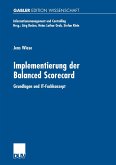The "Harvard Balanced Scorecard model" by Kaplan and Norton wishes to make strategies communicable and more manageable for companies across all management levels within the company. To this effect, the balanced scorecard is a qualitative controlling or performance management instrument. Only the Berliner Balanced Scorecard Approach takes the quantitative step towards a definitive formula for the Balanced Scorecard. Every perspective is given its own formula in the form of a shareholder value approach, e.g. a potential or employee perspective with the aid of the Berliner Human Resources Evaluation Model. All perspectives are linked in mathematical business context and the Berlin Balanced Scorecard Approach can be made dynamic by means of the company assessment. This makes international company management possible at all management levels and, for example, personnel management instruments can be derived such as a remuneration management system, a human resources model but also evaluations of strategies, controlling calculations and approaches to innovation evaluation. The book is aimed at practitioners in controlling, financial controlling, Human Resources and at students at universities and colleges.
Bitte wählen Sie Ihr Anliegen aus.
Rechnungen
Retourenschein anfordern
Bestellstatus
Storno








